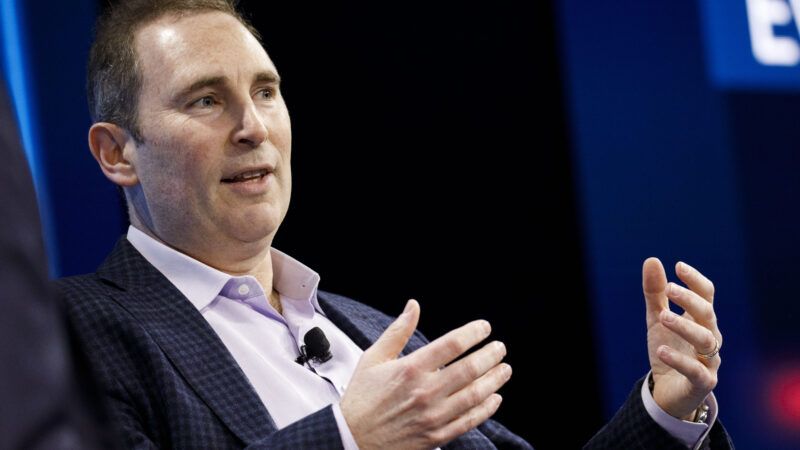Labor Board Goes After Amazon CEO for Suggesting Workers Might Be 'Better Off' Without Unions
The First Amendment applies even to the CEOs of successful companies, but the NLRB seems to disagree.

Better not read this post out loud to anyone—federal labor regulators might not like it.
The National Labor Relations Board (NLRB) stretched its speech-policing powers to new highs last week when an in-house administrative judge ruled that Amazon CEO Andy Jassy had violated federal labor law by expressing anti-unionization views during several televised interviews in recent years. Specifically, Judge Brian Gee dinged Jassy for suggesting that Amazon employees might be "better off" without a union and the layers of bureaucracy that come with it.
Jassy made those comments during an appearance on CNBC in 2022—during a segment in which he was discussing Amazon's response to ongoing unionization efforts at some warehouses. In the ruling, Gee highlighted similar comments that Jassy made during public forums hosted by The New York Times and Bloomberg.
The First Amendment protects Jassy's right to talk about those things and federal labor law allows employers to discuss unionization as long as they are not harassing or intimidating employees by doing so.
None of that seems to matter to the NLRB. In the ruling, Gee said Jassy had engaged in unlawful "coercive predictions about the effects of unionization" and ordered Amazon to post notices at its facilities reminding workers of their rights.
The punishment isn't really the point, however. Going after Jassy for remarks made in obviously public forums—comments that certainly were not meant to harass or intimidate current or would-be union members—is a signal that the NLRB sees virtually no limit to its powers to police executives' speech.
"Reasonable people may disagree about the line between permissible and impermissible speech" within the bounds of federal labor laws, said Edwin Egee, a vice president at the National Retail Federation, in a statement. "However, if Judge Gee's decision is left to stand, the effect would be to erase this line entirely. Employers would rightly wonder whether they can speak about unionization at all, despite their legally protected right to do so."
Gee's ruling in the Amazon case sits awkwardly alongside other recent rulings by the NLRB that gave wide leeway to employees' speech about similar topics. As the Washington Examiner noted, the NLRB in January forced Amazon to rehire an employee who had been sacked after directing an expletive-laden tirade at a fellow worker.
Meanwhile, some Google employees who were fired after protesting the company's contractual relationship with the state of Israel have filed a complaint with the NLRB asking to be reinstated. The former workers say they were unfairly terminated for engaging in speech that was "directly and explicitly connected to their terms and conditions of work," The Washington Post reported.
It's too soon to know how the NLRB will handle that case, but something has to give. It simply cannot be true that federal labor law permits employees to engage in any and all conduct without consequence, while simultaneously preventing CEOs and employers from speaking freely during media appearances and other public forums.
Federal bureaucrats don't have the authority to decide that all speech is either mandatory or forbidden—and whether they like it or not, the First Amendment applies even to the CEOs of successful businesses.


Show Comments (27)